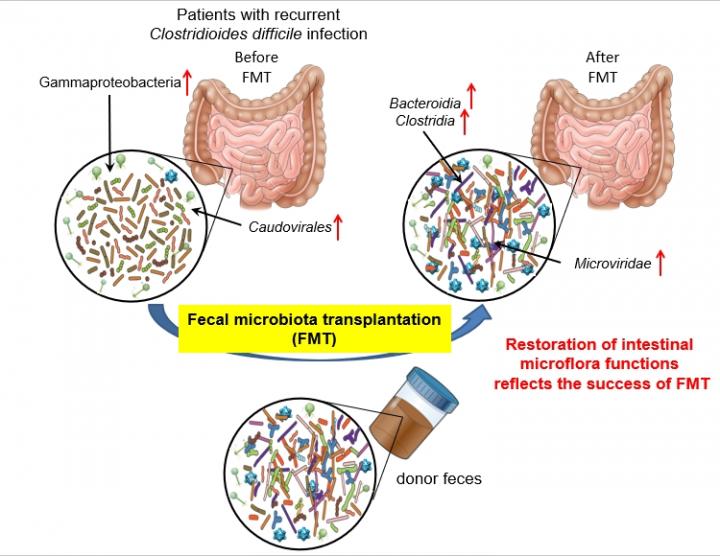Osaka City University demonstrates success of fecal microbiota transplantation (FMT) by revealing the coordinated effort of bacteriophages (phages) and their host bacteria in restoring human intestinal flora

Credit: Satoshi Uematsu, Osaka City University
Clostridioides difficile infection (rCDI) occurs in the gut and is caused by the Gram-positive, spore-forming anaerobic bacterium, C. difficile when its spores attach to fecal matter and are transferred from hand to mouth by health care workers. Patients undergoing antibiotic treatment are especially susceptible as the microorganisms that maintain a healthy gut are greatly damaged by the antibiotics.
Treatment of rCDI involves withdrawing the causative antibiotics and initiating antibiotic therapy, although this can be very challenging. Fecal microbiota transplantation (FMT) is considered an effective alternative therapy as it addresses the issue from the ground up by replacing the damaged microflora with a healthy one through a stool transplant.
However, two deaths caused by antibiotic-resistant bacterial infections after FMT were reported in 2019, suggesting that a modification of FMT or alternatives are required to resolve safety concerns surrounding the treatment.
Researchers at Osaka City University and the Institute for Medical Science, University of Tokyo tackled this challenge head on in a great study now published in Gastroenterology.
Using their original analysis pipeline reported in 2020, the researchers obtained intestinal bacterial and viral metagenome information from the fecal samples of nine rCDI patients from Brigham and Women’s Hospital in Boston who successfully had a FMT. They revealed the bacteria and phages involved in the pathogenesis of rCDI and the remarkable pathways important for the recovery of intestinal flora function.
By revealing how the bacteriome and virome in the intestine work together as an organ, the research team was able to show how FMT can be as safe as swapping out a bad organ with a good one.
“Intestinal microbiota should definitely be treated as an ‘organ’!” says principal investigator Professor Satoshi Uematsu, “FMT drastically changed the intestinal bacteriome and virome and is sure to restore the intestinal bacterial and viral functions.”
In the post-COVID-19 world, rCDI will become one of the more pressing international diseases. There is no doubt that FMT is an important therapeutic strategy for rCDI. “In addition to a variety of clinical surveys, comprehensive metagenomic analysis is very important in considering the safety of FMT.” say Dr. Kosuke Fujimoto and Prof. Seiya Imoto.
###
We are Osaka City University – the oldest research university in Osaka. With 9 undergraduate faculties and 11 graduate schools all dedicated to making urban life better, energy cleaner, and people healthier and happier, we have won numerous awards and have produced 2 Nobel laureates. For more information, please visit our website at https:/
Media Contact
James Gracey
[email protected]
Original Source
https:/
Related Journal Article
http://dx.




